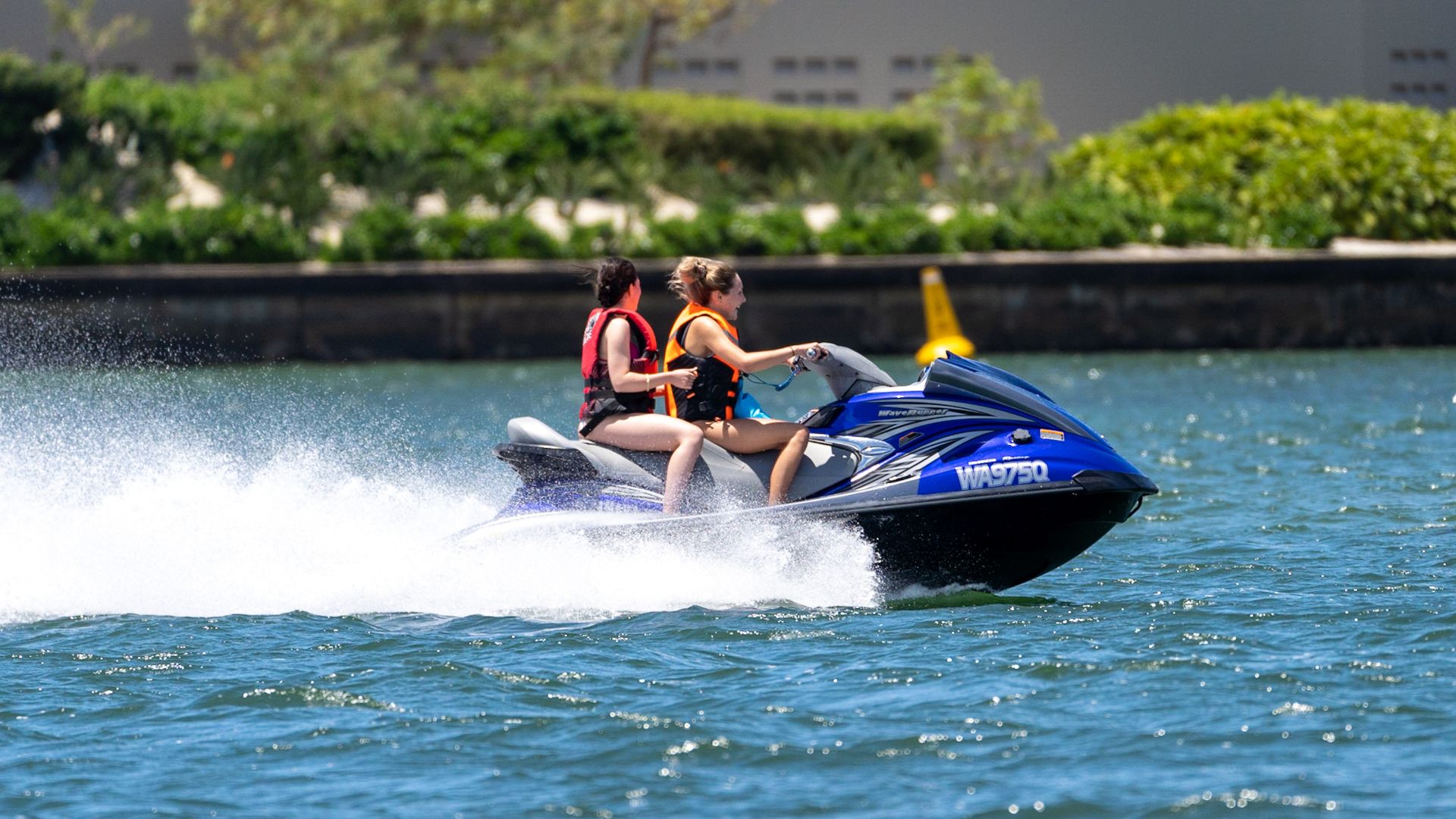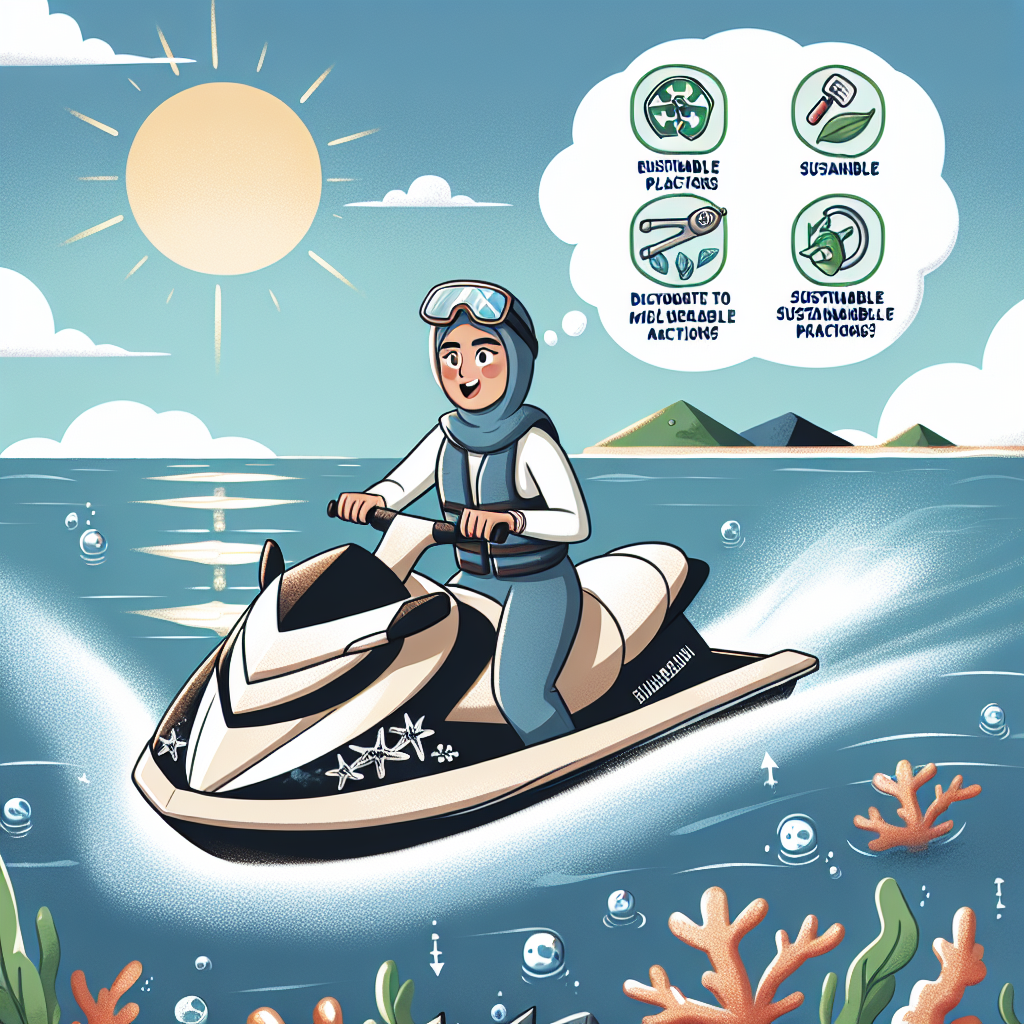Top Eco-Friendly Practices for Jet Skiing

Looking to have a thrilling adventure on the water while still being environmentally conscious? Look no further! In this article, we’ll explore the top eco-friendly practices for jet skiing. Whether you’re a seasoned jet skier or a beginner, these practices will help you minimize your impact on the environment while still enjoying the thrill of riding the waves. So, if you’re ready to make a difference and have a blast, keep reading! Oh, and if you’re in the Orange Beach area, we highly recommend renting your jet ski from the watersport experts at A2Z Powersport, located at the Fort Morgan Marina. They offer top-notch equipment and have a strong commitment to eco-friendly jet skiing practices. Don’t miss out on this unbeatable experience!
Eco-Friendly Fuel Options
Opt for Electric-Powered Jet Skis
When it comes to fuel options for jet skis, electric-powered models are a great choice for eco-conscious riders. Electric jet skis are powered by rechargeable batteries, eliminating the need for fossil fuels and reducing harmful emissions. By opting for electric-powered jet skis, you can enjoy the thrill of riding while minimizing your carbon footprint.
Consider Biofuel Alternatives
If electric-powered jet skis are not readily available or suitable for your needs, another eco-friendly fuel option to consider is biofuel. Biofuels are derived from renewable sources such as plants, algae, or even recycled cooking oil. Using biofuels in your jet ski can significantly reduce greenhouse gas emissions and contribute to a cleaner environment.
Use Low-Emission Fuel
If electric or biofuel options are not accessible, another way to minimize your impact on the environment is by using low-emission fuel in your jet ski. Low-emission fuels are specifically formulated to reduce harmful pollutants, such as sulfur and nitrogen oxides, that contribute to air pollution. Choosing low-emission fuel can help protect the air quality and aquatic ecosystems.
Proper Maintenance
Regularly Service the Jet Ski
Maintaining your jet ski in good condition is not only beneficial for its overall performance but also for the environment. Regular servicing helps ensure that the engine is running efficiently, reducing fuel consumption and emissions. Schedule routine maintenance with a certified technician to keep your jet ski in top shape.
Check for Leaks and Repair Promptly
Leaking fuel or oil can have a detrimental impact on the aquatic environment. It is crucial to regularly inspect your jet ski for any signs of leaks and address them promptly. By repairing leaks as soon as possible, you prevent harmful substances from entering the water and protect marine life from potential contamination.
Use Eco-Friendly Cleaning Products for Maintenance
When cleaning your jet ski, opt for eco-friendly cleaning products. Traditional cleaning products often contain harsh chemicals that can harm aquatic ecosystems. Look for biodegradable and non-toxic alternatives that are specifically formulated to minimize environmental impact. By choosing eco-friendly cleaning products, you can ensure that both your jet ski and the surrounding water remain clean and safe.
Responsible Water Usage
Avoid Disposing of Waste in the Water
One of the fundamental principles of eco-friendly jet skiing is to avoid disposing of waste in the water. This includes any trash, food scraps, or personal items that could pollute the marine environment. Always bring a designated trash bag with you and dispose of waste properly on land. Be mindful of any waste that could end up in the water, such as plastic bottle caps or wrappers.
Stay Away from Sensitive Marine Areas
To protect fragile marine ecosystems, it is essential to avoid riding your jet ski in sensitive marine areas. These areas often serve as critical habitats for various marine species and can be easily disturbed by noise, pollution, and propeller damage. Familiarize yourself with local regulations and guidelines to identify and stay away from these protected areas.
Adhere to Speed Limits and No-Wake Zones
Responsible water usage also includes adhering to speed limits and respecting designated no-wake zones. Speeding excessively can not only be dangerous but also disrupt marine life and cause erosion along the shoreline. Additionally, no-wake zones are established to minimize the impact of boat wakes on sensitive shorelines and wildlife habitats. By following these restrictions, you can contribute to a sustainable and harmonious water environment.
Noise Reduction
Opt for Electric Jet Skis for a Quieter Experience
In addition to being eco-friendly, electric jet skis offer the advantage of producing much less noise compared to traditional gasoline-powered models. By opting for an electric jet ski, you can enjoy a quieter riding experience and reduce noise pollution, which can disturb both marine life and other watercraft users.
Use Noise-Canceling Devices
If you are using a conventional jet ski, consider using noise-canceling devices to minimize noise pollution. Noise-canceling technologies, such as mufflers or exhaust systems, can significantly reduce the noise emitted by your jet ski. By utilizing these devices, you can minimize your impact on the aquatic environment and ensure a more peaceful experience for yourself and others.
Avoid Revving the Engine Unnecessarily
Excessive revving of the jet ski engine not only wastes fuel but also contributes to unnecessary noise pollution. Be conscious of your throttle usage and avoid excessive engine revving when not needed. By keeping the engine noise to a minimum, you can enjoy a more peaceful ride while being considerate of the marine environment and surrounding wildlife.
Wildlife Conservation
Keep a Safe Distance from Marine Animals
As a responsible jet skier, it is essential to keep a safe distance from marine animals. Approaching wildlife too closely can cause stress, disrupt their natural behaviors, and even lead to injuries. Maintain a respectful distance and observe marine animals from afar, ensuring their well-being and preserving their natural habitats.
Avoid Disturbing Nesting or Breeding Areas
Nesting and breeding areas serve as crucial habitats for many species of marine animals. It is crucial to avoid disturbing these areas to protect the animals and their young. Be aware of nesting season timings and signs indicating protected areas. By steering clear of these sensitive zones, you can safeguard the survival and reproductive success of marine species.
Do Not Feed Wildlife
While it may be tempting to feed wildlife, it is important to refrain from doing so. Feeding wildlife disrupts their natural foraging behaviors and can lead to dependency on human-provided food. This can result in negative impacts on their health and alter the natural balance of the ecosystem. Appreciate marine animals from a distance and let them find their own food sources.
Educating Yourself and Others
Stay Informed about Environmental Regulations and Guidelines
To be a responsible jet skier, it is crucial to stay informed about environmental regulations and guidelines related to jet skiing in your area. Familiarize yourself with local regulations regarding speed limits, no-wake zones, and protected marine areas. By understanding and following these rules, you can contribute to sustainable jet skiing practices.
Share Eco-Friendly Practices with Others
Spread the word about eco-friendly jet skiing practices to help raise awareness among fellow enthusiasts. Share your knowledge and recommend sustainable practices to others. By encouraging a community of environmentally conscious jet skiers, we can collectively make a positive impact on the aquatic environment.
Support Organizations Working for Marine Conservation
Supporting organizations dedicated to marine conservation is an impactful way to contribute to the preservation of our oceans and waterways. Consider donating or volunteering for local initiatives that focus on protecting marine ecosystems, conducting research, or advocating for sustainable water recreation practices. By supporting these organizations, you can actively contribute to the long-term health of our marine environments.
Reducing Plastic Waste
Minimize Single-Use Plastic Usage
Plastic pollution poses a significant threat to marine life and ecosystems. As a responsible jet skier, minimize your use of single-use plastics, such as plastic water bottles and disposable utensils. Opt for reusable alternatives like stainless steel water bottles and eco-friendly food containers. By reducing your reliance on single-use plastics, you can help combat plastic pollution and protect marine environments.
Properly Dispose of Trash and Recycling
Always ensure proper disposal of trash and recycling when you are out on the water. If there are no designated recycling bins available, store your recyclables and dispose of them appropriately on land. Avoid throwing any waste overboard or leaving it on beaches or in the water. Proper waste management is crucial for maintaining the cleanliness of our waterways and protecting marine life.
Participate in Beach Clean-Ups
Get involved in local beach clean-up initiatives to actively combat plastic waste and pollution. Beach clean-ups are a great way to connect with the community, contribute to cleaner coastlines, and protect marine life. Join organized clean-up events or organize your own with friends and family. Every small action counts in the collective effort to reduce plastic waste and promote a healthier marine environment.
Eco-Friendly Accessories
Use Biodegradable Sunscreen
When spending time in the water, it is important to protect your skin from the sun’s harmful rays. However, traditional sunscreens often contain chemicals that can be harmful to marine life and coral reefs. Opt for biodegradable and reef-safe sunscreens to ensure that your skin stays protected without negatively impacting the aquatic ecosystem.
Opt for Eco-Friendly Life Jackets
Ensure that your safety gear aligns with your eco-friendly mindset by choosing eco-friendly life jackets. Look for life jackets made from sustainable materials or those that have been manufactured using environmentally friendly processes. By selecting eco-friendly life jackets, you support the conservation of natural resources and promote responsible manufacturing practices.
Choose Sustainable Fishing Gear
If you enjoy fishing while jet skiing, make sure to choose sustainable fishing gear. Avoid using lead sinkers which can be toxic to wildlife and opt for alternatives made from non-toxic materials. Additionally, consider using barbless hooks to minimize harm to fish and reduce catch-and-release mortality rates. By utilizing sustainable fishing gear, you can enjoy your fishing activities while minimizing negative impacts on marine life.
Encouraging Responsible Riding
Avoid Excessive Speeds and Frequent Maneuvering
To minimize your environmental impact while riding a jet ski, avoid excessive speeds and frequent maneuvering. Higher speeds consume more fuel and can cause increased noise and wave disturbances. By maintaining a moderate speed and smooth riding style, you can enjoy your jet ski while being considerate of the environment and other water users.
Respect Other Watercraft and Swimmers
Responsible riding also involves showing respect for other watercraft and swimmers. Be mindful of your surroundings and give ample space to other vessels. Avoid creating wakes that can be disruptive or dangerous to smaller boats or swimmers. By practicing courtesy and maintaining a safe distance, you contribute to a safer and more enjoyable water environment for everyone.
Follow Boating and Jet Skiing Regulations
Ensure that you are familiar with and adhere to all relevant boating and jet skiing regulations in your area. These regulations are in place to promote safety and protect the environment. Familiarize yourself with speed limits, right-of-way rules, and any specific regulations for jet skis. By following these regulations, you can actively contribute to responsible and sustainable jet skiing practices.
Promoting Sustainable Tourism
Choose Eco-Friendly Tour Operators and Rental Companies
When planning a jet skiing adventure, opt for eco-friendly tour operators and rental companies. Look for companies that prioritize environmental stewardship and sustainability in their operations. These operators often have a commitment to responsible jet skiing practices and may provide educational experiences that raise awareness about the local ecosystem.
Ask About Their Environmental Practices
Before renting a jet ski or booking a tour, take the time to inquire about the company’s environmental practices. Ask about their fuel options, maintenance protocols, and waste management procedures. Choosing a company that aligns with your eco-friendly values means supporting businesses that prioritize environmental conservation and responsible tourism.
Support Local Conservation Projects
Contribute to the preservation of marine environments by supporting local conservation projects. Many organizations work tirelessly to protect and restore coastal ecosystems. Consider making a donation or volunteering your time to help these initiatives thrive. By supporting local conservation projects, you can actively contribute to the sustainability and welfare of our marine environments.
In conclusion, as a jet skier, there are many ways you can embrace eco-friendly practices to minimize your impact on the environment. By opting for electric-powered or biofuel jet skis, practicing proper maintenance, being mindful of water usage, reducing noise pollution, conserving wildlife, educating yourself and others, reducing plastic waste, using eco-friendly accessories, promoting responsible riding, and supporting sustainable tourism, you can enjoy the thrill of jet skiing while preserving the beauty and health of our waterways for future generations. Remember to rent your jet skis from the watersport experts at A2Z Powersport, located in Orange Beach, AL, for a responsible and unforgettable jet skiing experience.
For bookings and inquiries, contact A2Z Powersport at:
- Address: Fort Morgan Marina 1577 AL-180 W, Orange Beach, AL 36542
- Phone: (954) 296 1862
- Email: bookings@a2zpowersport.com










